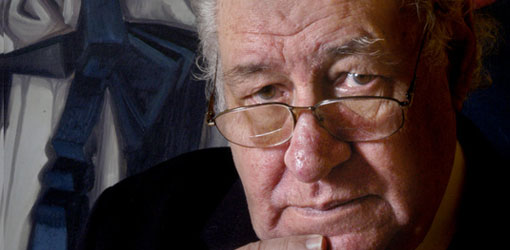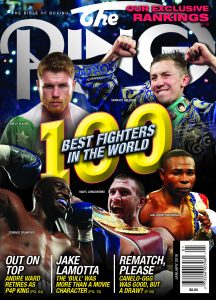‘The Fight Doctor’ Ferdie Pacheco, 89, passes away

Dr. Ferdie Pacheco, best known as Muhammad Ali’s personal physician during the “Ali Circus” years, as well as an Emmy-winning analyst who worked for NBC and Showtime, died Thursday at age 89.
“It is with a heavy heart that I have to announce to the world the passing of my wonderful Dad, Ferdie Pacheco,” daughter Tina Louise Pacheco, a freelance film editor, wrote on her Facebook page. “He was a pharmacist, a doctor, a boxing commentator, a painter and a writer. But to me he was just ‘Papa.’ It’s a heartbreak to lose a parent but I know he’ll always be with me.”
Born December 8, 1927 in Ybor City, Florida – the Spanish quarter of Tampa – Pacheco was born into a family of doctors whose lineage, he said, went back several centuries. His father, J.B., was a pharmacist and young Ferdie developed his love of medicine while working at his father’s drugstore. In exchange for the son’s willingness to help at the store and to undergo an apprenticeship in pharmacy, the father paid for Pacheco’s college education. Following stints at Tennessee and Spring Hill College, Pacheco earned a bachelor’s degree from the University of Florida and a medical degree from the University of Miami, after which he served his internship at Mount Sinai Hospital.
In late 1959, Pacheco set up a medical practice in Miami’s tough Overton neighborhood in order to provide care for the poor. According to his autobiography “Blood in My Coffee: The Life of the Fight Doctor,” Pacheco charged five dollars for an office visit, and offered free care for children up to two years old as well as for anyone 60 years or older. He estimated he saw 50 to 100 patients per 11-hour day and his blend of high-level skill and compassion made him a beloved figure. He later opened a second office to address the influx of Cubans escaping Fidel Castro’s Communist regime.
By 1960, Pacheco, long a boxing fan – especially after meeting Jack Dempsey as an eight-year-old – was a regular attendee at cards promoted by Chris Dundee. Needing a facility to treat Dundee’s African-American boxers, the promoter approached Pacheco, who gleefully accepted the assignment. For the next 20 years he was the 5th Street Gym doctor and, according to his book, he provided free care not only for the boxers but also their retinues. It was in this setting where Pacheco was dubbed “The Fight Doctor” and, through Chris, he met Chris’ younger brother, a brilliant young trainer named Angelo. Angelo Dundee soon named Pacheco as part of his three-man corner; while Dundee worked on the cuts and communicated strategy, masseur Luis Sarria rubbed out the kinks and Pacheco attended to all other injuries. During his years with Dundee, Pacheco was in the corner for 12 world champions, including the most famous of all – Muhammad Ali.
As Ali’s personal physician, Pacheco was a fixture in “The Ali Circus” for 17 years. He was in Miami Beach when the then-Cassius Clay shockingly dethroned “The Big Ugly Bear” Sonny Liston. He was there through Ali’s glorious prime when he notched nine title defenses in less than 22 months. He was there through the three-and-a-half year exile and at Madison Square Garden for the classic first fight between Ali and champion Joe Frazier. He was in the corner when Ali completed the long road back to a second title shot, which saw the Circus travel to Zaire and which saw Ali stun the world with an eighth-round knockout of George Foreman. He also bore witness to the gradual physical decline that marked Ali’s second title reign, which included incredibly punishing sparring sessions, in which Ali willingly let his opponents hit him to the body. Though Pacheco advised Ali to retire following the grueling “Thrilla in Manila” in October 1975, the fighter refused to accept his counsel. Pacheco reluctantly continued his association with Ali but following Ali’s hard-fought 15-round decision victory over Earnie Shavers in September 1977, he decided to leave the team.
“The Shavers fight was the final straw for me,” Pacheco told author Thomas Hauser in “Muhammad Ali: His Life and Times.” “After that fight Dr. (Vincent) Nardiello, who was with the New York State Athletic Commission, gave me a laboratory report that showed Ali’s kidneys were falling apart. Instead of filtering out blood and turning it to urine, pure blood was going through. That was bad news for the kidneys and, since everything in the body is interconnected, we were talking about the disintegration of Ali’s health. So I went back to my office in Miami, sat down, and wrote Ali a letter saying his kidneys were falling apart. I attached a copy of Nardiello’s report and mailed three extra copies, return receipt requested: One to (manager) Herbert Muhammad, one to Angelo and one to Veronica, who, at the time, was Ali’s wife. And I didn’t get an answer from any of them, not one response. That’s when I decided enough was enough.”
Despite their disagreement, Pacheco and Ali remained friends and Pacheco was always appreciative of the impact Ali had on his life.
“You could call me ‘almost famous,’ ” Pacheco wrote in “Blood in My Coffee,” “Jackie Gleason was famous. Art Carney was almost famous. Movie stars are famous; character actors are almost famous. George Clooney is famous. Steve Buscemi is – well you get the idea. In boxing, Muhammad Ali was a superstar. His trainer, Angelo Dundee, was almost famous. Me, too.
“It’s nice to be known but still move unimpeded through the day,” he continued. “I get a good table at restaurants, tickets to sold-out Broadways shows, hotel rooms, and seats on overbooked flights, and very few hassles and obligations in exchange for these courtesies. Who could complain about that? Not me. I’m almost famous.”
After splitting with Ali, Pacheco gained fame on his own merits, as opposed to his associations with others. The fluently-bilingual Pacheco provided ringside commentary for NBC and its Spanish-language sister network Univision, after which he became an analyst for Showtime, alongside blow-by-blow man Steve Albert and analyst Bobby Czyz. His work earned him two Emmy awards.
He authored more than 20 books, including “Fight Doctor,” in 1977, “Muhammad Ali: A View from the Corner” in 1992, “Ybor City Chronicles: A Memoir” in 1994, “Pacheco’s Art of Ybor City” in 1997, “The Christmas Eve Cookbook: With Tales of Nochebuena and Chanukah” in 1998, “Blood in My Coffee: The Life of the Fight Doctor” in 2005, “Who is Artie Shaw and Why is He Following Me?” in 2005, and “Tales from the 5th Street Gym: Ali, the Dundees, and Miami’s Golden Age of Boxing” in 2010. He also co-authored several others, including “The Columbia Restaurant Spanish Cookbook” with Adela Hernandez in 1995, “Nino Pernetti’s Caffe Abbracci Cookbook: His Life Story and Travels Around the World,” with Nino Pernetti, and “The 12 Greatest Rounds of Boxing: The Untold Stories,” with Mills Lane in 2000. In addition to his books, Pacheco wrote numerous plays, screenplays and short stories.
In 2011, Pacheco released a book entitled “Pacheco’s Art of the Cubans in Exile,” that depicted 33 of his paintings. Though self-taught, Pacheco’s work earned positive reviews; his rendering of Mahatma Ghandi was made into a postage stamp in 2009 and one work hangs inside the United Nations.
Another example of Pacheco’s reach includes a 2004 film entitled “Ferdie Pacheco: The World of the Fight Doctor.” Actor Paul Rodriguez portrayed Pacheco in the 2001 film “Ali,” that starred Will Smith.
Pacheco was inducted into the Florida Boxing Hall of Fame in 2009 and is also an inductee of the World Boxing Hall of Fame.
On Pacheco’s own public Facebook page, the final entry – which was posted at 1:38 p.m. on Wednesday – features the following quote: “In essence, the whole thing of life is to just keep trying to do good things. Just do good things for people.”
Not only did Pacheco try, he succeeded beyond all measure.
*
Lee Groves is a boxing writer and historian based in Friendly, West Virginia. He is a full member of the BWAA, from which he has won 15 writing awards, including 12 in the last seven years and two first-place awards since 2011. He has been an elector for the International Boxing Hall of Fame since 2001 and is also a writer, researcher and punch-counter for CompuBox, Inc. He is the author of “Tales from the Vault: A Celebration of 100 Boxing Closet Classics (available on Amazon)” and the co-author of the upcoming book “Muhammad Ali: By the Numbers.” To contact Groves, use the email [email protected].
Struggling to locate a copy of THE RING Magazine? Try here or
Subscribe

You can order the current issue, which is on newsstands, or back issues from our subscribe page.
On the cover this month: THE RING 100














